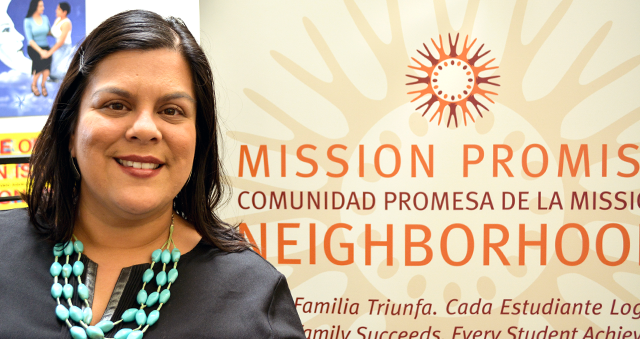Co-authored by:
Associate Director Liz Cortez
Early Learning Program Manager Ada Freund
First 5 California is this week convening early-childhood stakeholders from across the state for the 2020 Child Health, Education, and Care Summit. The summit’s theme, “Equity in Action: Elevating Children, Families, and California’s Workforce,” will focus on sharing best practices around building partnerships and promoting collective impact in the early care and education field, as a means to optimally benefiting young children and their families
Mission Promise Neighborhood (MPN) will be presenting and sharing our Abriendo Puertas/Opening Doors collective impact work around partnering with parents and community organizations to positively impact kinder-readiness outcomes in San Francisco’s Mission District.
MPN is an equity initiative: Our 15+ partners are together serving the highest-needs children in our community. Through MPN — a collective impact approach comprising many partner organizations — we are creating positive outcomes for our children, youth and families via evidence-based programming and leadership development that empowers our community to advocate for the needs of both their families and the Mission. In collaboration with Abriendo Puertas/Opening Doors National and various local organizations, many of which are part of First 5 San Francisco’s Family Resource Center initiative, we are weaving a strong social fabric to support and nurture our community. This translates to building generational wealth, while simultaneously laying pathways for academic success along a prenatal-to-college continuum. Through culturally relevant family engagement, critical services, and leadership development and advocacy, we are strengthening our community from the ground up, with an inherent piece of our work being that families are partners in the process.
Organizations such as Abriendo Puertas have been critical in this process. Abriendo Puertas’ mission is to “support parents in their roles as family leader and as their child’s first and most influential teacher in a home that is their child’s first school” aligns with the goals of MPN. This two-generation approach builds parent leadership skills and knowledge to promote family well-being and positive education outcomes for children. Abriendo Puertas is the nation’s first evidence-based comprehensive training program developed by and for Latino parents with children ages 0-5.
The Abriendo Puertas institute and comprehensive curriculum has helped us develop the structure and resources to inform, guide and inspire our community to take ownership of our school-readiness efforts. Our facilitators, which includes parents, empower families to learn about healthy child development, school readiness, and advocacy.
In 2017, MPN began growing the number of organizations that offer Abriendo Puertas; the catalyst was the creation of an Abriendo Puertas professional learning community to double the number of families who access the program. Since that time, we have watched in awe as partnering organizations have exponentially implemented robust programming around Abriendo Puertas. Working together to increase access has been a successful collective effort: MPN has been able to reach more and more families every year. (Read brief for more information about our PLC model).
Our success in working together to break down organizational silos is due in large part to our commitment to a collective impact approach that includes: a common agenda; collecting data and consistently measuring results; coordinating mutually reinforcing activities; open and continuous communication; and, most importantly, partnering with families in an authentic way. Backbone staff support the aforementioned efforts.
In our community, the graduating families of Abriendo Puertas are interested in advocacy and leadership opportunities. As part of our partner collective work, MPN is building a pathway by connecting parents to additional opportunities after they finish a series. The Abriendo Puertas curriculum is the ideal fit for our community because it encourages parents to advocate for what they need. Take the case of parent facilitator Albertina, who shared the following: “The program teaches us how to advocate for our children … helping to open doors for school success.”
Ultimately, MPN’s goal is that Latino families are decision-makers in the institutions and political systems that affect their lives. Abriendo Puertas is the vehicle to making that a reality.
We are breaking cycles, through relationships, sustained effort, and access to information and resources. Families are partners in being part of the solution. Starting with success in the home environment and the early years — and changing the systems that do not work well for our community — families are creating a healthy foundation and ongoing progress to set themselves on track for lifelong success.
This is the collective work of MPN — and our promise to the next generation.





